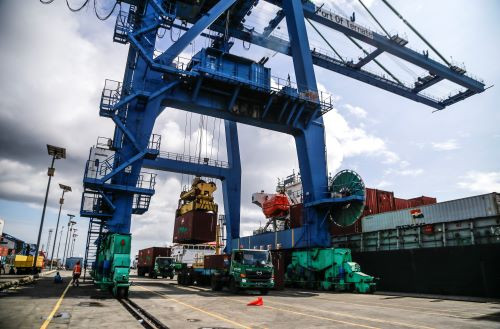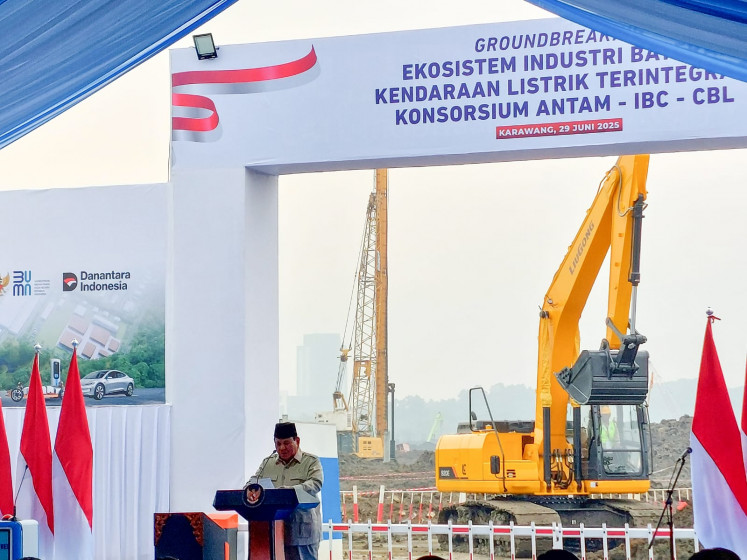Popular Reads
Top Results
Can't find what you're looking for?
View all search resultsPopular Reads
Top Results
Can't find what you're looking for?
View all search resultsQ1 investments boom, but jobs remain scarce
Strong investment growth in Indonesia in the first quarter (Q1) failed to translate into greater job generation, as companies sidestepped rising labor costs by investing more in capital-intensive sectors than labor-intensive ones
Change text size
Gift Premium Articles
to Anyone

S
trong investment growth in Indonesia in the first quarter (Q1) failed to translate into greater job generation, as companies sidestepped rising labor costs by investing more in capital-intensive sectors than labor-intensive ones.
Only 260,000 jobs were created on total realized investments that grew by an impressive 15 percent to hit Rp 107 trillion (US$9.3 billion) in the first quarter this year, according to the Investment Coordinating Board's (BKPM) latest statistics.
That was a 40 percent decline from 361,000 jobs created in the first quarter last year, and a far cry from the 430,000 jobs generated in the fourth quarter last year.
'We can now say that investments are now shifting into capital-intensive sectors,' BKPM chairman Mahendra Siregar noted.
The National Development Planning Board (Bappenas) targets to push down the unemployment rate to 5.7-5.9 percent by the end of next year, from 6.3 percent at the moment.
But the government might find it more difficult going forward to boost its economic growth amid a downward trend in Indonesia's labor absorption over the past few years.
The 2012 state budget stipulated that every 1 percent of the gross domestic product (GDP) should create at least 400,000 jobs. But Bappenas' latest study shows that the economy is currently only able to generate 220,000 jobs for the same level of economic expansion.
The situation is exacerbated by Indonesia's annual GDP growth that sat at a four-year low level of 5.8 percent last year.
Deputy Finance Minister Bambang Brodjonegoro said the shift of investments from labor-intensive to capital intensive sectors was a normal trend occurring across the globe, notably in emerging countries like Indonesia that were moving to an upward economic level.
'However, I acknowledge that our industries are now finding it harder to survive amid competition with other countries in the region that are offering cheaper labor and other incentives,' he said recently.
Indonesia, Southeast Asia's largest economy, has seen its competitiveness dwindle in part due to rising labor costs nationwide.
For example, Jakarta, which houses several textile, garment and footwear manufacturers, increased the minimum wage by 11 percent to Rp 2.4 million for this year after a 42 percent increase last year.
In comparison, in the Bekasi municipality, the minimum wage increased 16 percent to Rp 2.44 million this year, following a 43 percent increase from last year's Rp 2.1 million. Meanwhile, Bekasi regency's minimum wage rose 22 percent this year to Rp 2.44 million, whereas it rose 34 percent last year to Rp 2.00 million.
Both Bekasi municipality and regency are home to many mid-sized, capital-intensive industries.
'Given continually higher minimum wages, rigid labor regulations and slow growth in labor productivity, Indonesia's labor is becoming less competitive ' thus, investors are switching to capital-intensive projects,' noted Fauzi Ichsan, a senior economist with Standard Chartered.
Responding to the issue, Indonesian Employers Association (Apindo) chairman Sofjan Wanandi said he would propose a new wage differentiation scheme to the government in annual tripartite talks involving representatives of workers, employers and the government,
The proposal suggests the government allow different minimum wage schemes for different companies, depending on their wage capacities and business scales.
Sofjan said some companies preferred to expand by buying machines instead of recruiting new workers as they had grown tired of dealing with 'noises' voiced by workers, whose wages continued to rise while productivity remained relatively stagnant.









